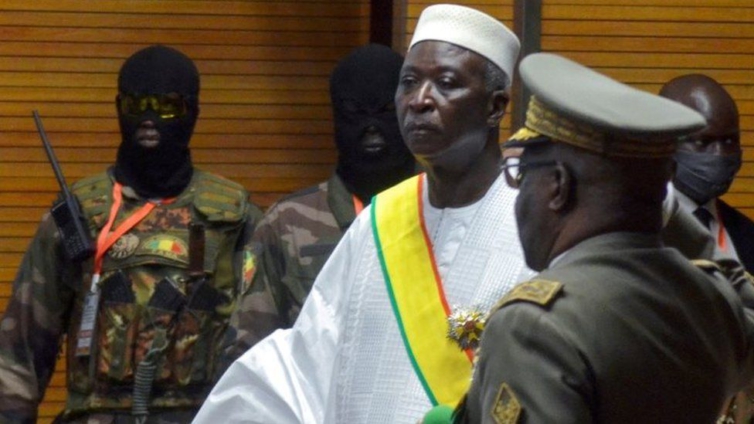UN chief António Guterres has demanded the immediate release of Mali's President Bah Ndaw and PM Moctar Ouane, who have been detained by soldiers.
They were driven by soldiers to a military camp near the capital, Bamako.
The two men have been leading an interim government which took power after a military coup last August.
They were detained just hours after a government reshuffle in which two army officers who took part in the coup were replaced.
Late on Monday, Mr Ouane told AFP in a phone call that soldiers "came to get him". The news agency said the line was then cut.
Defence Minister Souleymane Doucouré has also reportedly been detained.
The African Union, the Economic Community of West African States (Ecowas), the EU and the US have also condemned the arrests, saying Mali's top politicians must be released without any preconditions.
What has triggered the latest crisis?
Ibrahim Boubaca Keïta was ousted as president last year following weeks of anti-government protests over rising insecurity, alleged corruption and a failing economy.
His removal was generally celebrated - but the slow pace of change over the last nine months has been causing tensions.
An ongoing strike by the main union is in its second week and threatens to cripple the economy.
The interim government - overseeing the 18-month transition - agreed to appoint a new broader-based cabinet in the face of these problems and the threat of renewed protests.
Col Sadio Camara and Col Modibo Kone, who served as ministers of defence and security respectively, were dropped.
The opposition group behind the protests last year, M5 RFP, is also infuriated that it did not get rewarded with any ministerial positions.
Plus public confidence is waning over the army leaders' ability to tackle the Islamist insurgency that has spilled into neighbouring Burkina Faso and Niger.
A previous coup in 2012 led to militant Islamists exploiting the chaos and seizing the north of the country.
French troops helped regain territory, but attacks continue as the insurgents capitalise on the persistent political instability in the region.
What happens next?
Discussions are ongoing at the Kati military camp, where the president and prime minister are being held.
The talks have also involved members of the M5 RFP. The group has been critical of the prime minister, so may be angling to replace him, reports BBC World Service Africa editor Will Ross.
A delegation from Ecowas, which played a key role in setting up the transitional government, is also due to visit Bamako.
Latest Stories
-
Mahama vows to create an agro-processing zone in Afram Plains
11 mins -
Political parties should plan for losses, not just wins – IGP advises
13 mins -
524 Diasporan Africans granted Ghanaian citizenship in ceremony
14 mins -
Mahama urges Afram Plains North residents to avoid ‘skirt and blouse’ voting
16 mins -
Asantehene receives more 19th century gold ornament and regalia
23 mins -
Hohoe Ghana Blind Union organises training for members ahead of Election 2024
30 mins -
Alan Kyerematen reveals his future plans for Ghanaian Health professionals
31 mins -
AAIN empowers women and small enterprises in Upper East Region through SHINE project
32 mins -
Akufo-Addo leads nationwide commissioning of 80 educational projects
38 mins -
Ghana and Seychelles strengthen bilateral ties with focus on key sectors
1 hour -
National Elections Security Taskforce meets political party heads ahead of December elections
1 hour -
Samsung’s AI-powered innovations honored by Consumer Technology Association
2 hours -
Fugitive Zambian MP arrested in Zimbabwe – minister
2 hours -
Town council in Canada at standstill over refusal to take King’s oath
2 hours -
Trump picks Pam Bondi as attorney general after Matt Gaetz withdraws
2 hours

